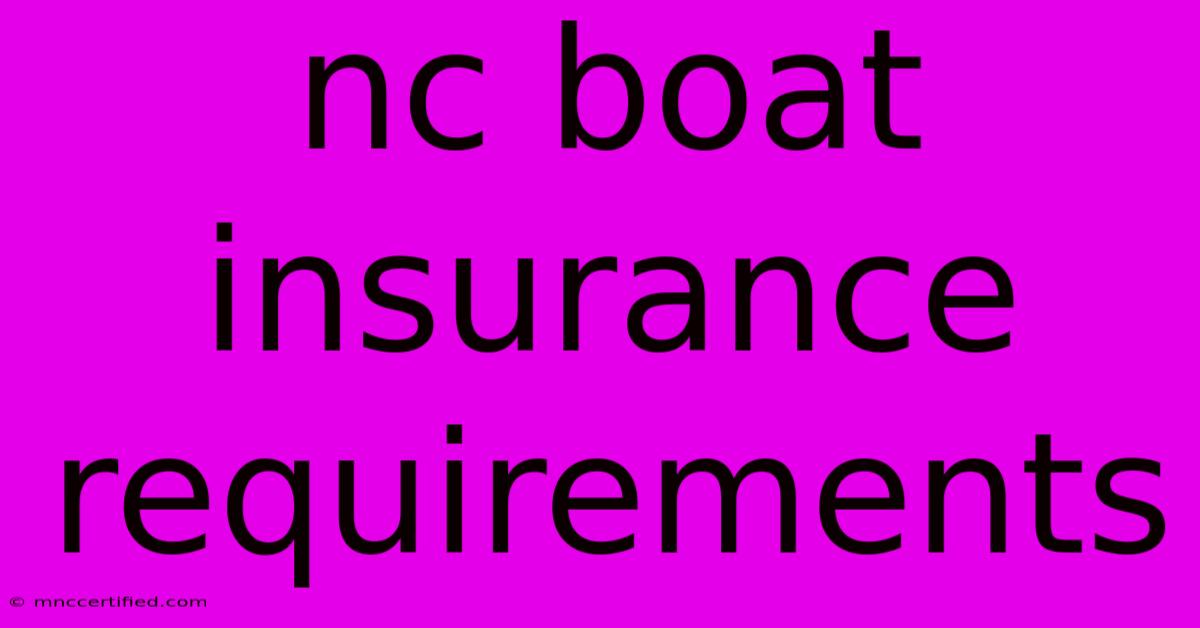Nc Boat Insurance Requirements

Table of Contents
NC Boat Insurance Requirements: A Comprehensive Guide for North Carolina Boaters
Navigating the waters of North Carolina requires more than just a skilled hand on the wheel; it demands a thorough understanding of the state's boating regulations, particularly concerning insurance. This comprehensive guide will delve into the North Carolina boat insurance requirements, helping you ensure you're legally protected on the water.
Do I Need Boat Insurance in North Carolina?
While North Carolina doesn't mandate boat insurance for all vessels, understanding your specific circumstances is crucial. The requirement hinges primarily on the size and type of your boat, as well as the presence of a mortgage or loan.
When Boat Insurance is Required in NC:
-
Financed Boats: If you've financed your boat through a lender, boat insurance is almost always mandatory. The lender will require it as a condition of the loan to protect their investment. Failure to maintain adequate coverage could lead to loan default.
-
Larger Vessels: While there's no blanket requirement for all boats, larger vessels—those exceeding a certain length or horsepower—may necessitate insurance. Check with the North Carolina Division of Motor Vehicles (NCDMV) for the most up-to-date specifications. This is especially important for commercial operations.
When Boat Insurance is Not Explicitly Required:
- Smaller, Unfinanced Boats: Smaller, privately owned boats without financing may not face a legal mandate for insurance. However, it's highly recommended to carry insurance even for smaller vessels. Accidents can happen, and the financial liability for damages or injuries can be substantial.
Types of Boat Insurance Coverage in NC
Understanding the different types of boat insurance coverage is key to securing adequate protection. Common coverages include:
-
Liability Coverage: This protects you financially if you cause damage to another person's property or injure someone while operating your boat. This is arguably the most important type of coverage. It covers legal fees and settlements.
-
Hull Insurance: This covers damage to your boat itself, whether from accidents, collisions, fire, or even theft.
-
Personal Injury Protection (PIP): Covers medical expenses for you and your passengers injured in a boating accident, regardless of fault.
-
Uninsured Boater Coverage: Protects you if you're involved in an accident with an uninsured boater.
-
Towing and Assistance: This coverage provides assistance in case of breakdowns or other emergencies on the water.
Factors Affecting NC Boat Insurance Costs
Several factors influence the cost of your North Carolina boat insurance:
-
Boat Type and Value: Larger, more expensive boats generally command higher premiums.
-
Boat Usage: Frequent use or commercial use will likely result in higher premiums compared to occasional recreational use.
-
Boater's Experience: Experienced boaters with a clean driving record tend to get better rates.
-
Location: Insurance rates can vary based on the location where your boat is kept and primarily used. High-risk areas may have higher premiums.
-
Deductible: Choosing a higher deductible will lower your premium, but you'll pay more out-of-pocket in case of a claim.
Finding the Right NC Boat Insurance
Shopping for boat insurance can feel overwhelming, but following these steps can streamline the process:
-
Compare Quotes: Obtain quotes from multiple insurance providers to compare coverage options and pricing.
-
Understand Your Needs: Carefully consider your boat's value, usage, and potential risks to determine the appropriate level of coverage.
-
Read the Fine Print: Thoroughly review the policy details before signing any contract.
-
Ask Questions: Don't hesitate to ask questions if anything is unclear. A reputable insurer will be happy to explain their policies.
Conclusion: Protecting Yourself on NC Waterways
While North Carolina doesn't have a universal boat insurance mandate, protecting yourself and others on the water is paramount. Understanding the nuances of NC boat insurance requirements and securing adequate coverage is crucial for responsible boating. Remember, even if not legally required, insurance offers invaluable peace of mind and financial protection against unexpected accidents and liabilities. Don't risk it—get insured.

Thank you for visiting our website wich cover about Nc Boat Insurance Requirements. We hope the information provided has been useful to you. Feel free to contact us if you have any questions or need further assistance. See you next time and dont miss to bookmark.
Featured Posts
-
Kimpembe Ends 21 Month Struggle
Nov 27, 2024
-
Arsenal 5 1 Sporting Cp Europa League Win
Nov 27, 2024
-
Manchester City Vs Feyenoord Live Cl Stream
Nov 27, 2024
-
Adcock Adcock Insurance Agency
Nov 27, 2024
-
Sporting Cp Vs Arsenal Live Score Updates
Nov 27, 2024